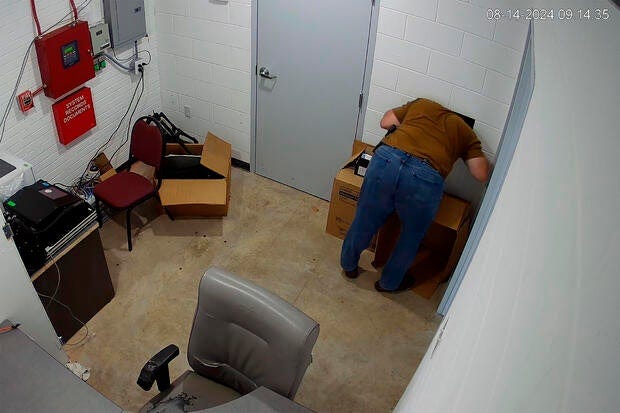To my new subscribers (and a reminder to loyal readers), welcome to Cops & Congress, where facts come first, followed by in-depth commentary and analysis. Paid subscribers enjoy exclusive access to scoops requiring investigation of public records. Your support directly funds the detailed research behind my independent journalism. (ICYMI: Six reasons to support my independent journalism)

Hanceville, Ala. — A small Alabama city has placed its entire police department on administrative leave after a grand jury issued a damning report recommending the agency be disbanded, calling it more of a “criminal enterprise” than a law enforcement body.
The Hanceville Police Department, which had eight officers as of August 2024, is now under scrutiny after multiple officers, including the police chief, were indicted on felony charges ranging from evidence tampering to drug distribution. The Cullman County Sheriff’s Office has temporarily assumed law enforcement responsibilities for the city of 3,200 residents, located about 45 miles north of Birmingham.
Cullman County District Attorney Champ Crocker and Sheriff Matt Gentry held a press conference on Thursday, emphasizing the severity of the case and the need to restore public trust in law enforcement.
‘Rampant Culture of Corruption’
The grand jury’s report, made public on February 21, outlined widespread misconduct within the department, alleging that officers had mishandled criminal evidence, abused their positions for personal gain, and compromised the integrity of the justice system.
“The Hanceville Police Department is a particular and ongoing threat to public safety,” the report stated. “It has recently operated as more of a criminal enterprise than a law enforcement agency.”
Among those indicted are Police Chief Jason Shane Marlin, Officers Cody Allen Kelso and Drew Shelnut, as well as Reserve Officer Eric Michael Kelso and his wife, Donna Kelso. The charges against them include misuse of state criminal databases, solicitation to commit a controlled substance crime, and unlawful distribution of drugs, according to court records.
In one of the most alarming allegations, security footage showed an individual using a broomstick through a hole in the evidence room wall to jimmy open the door, giving unauthorized access to stored evidence. The grand jury found that the evidence in the department’s possession was so compromised it was deemed “unusable,” raising concerns about pending criminal cases.
Death of a Dispatcher Sparks Investigation
The investigation into the department’s misconduct was triggered by the death of Chris Willingham, a Hanceville dispatcher found unresponsive at work in August 2024. An autopsy later determined he died from a fatal mix of fentanyl and other drugs.
“After the dispatcher died, I was insistent on the State Bureau of Investigation coming in to investigate everything going on at Hanceville,” District Attorney Crocker said.
The grand jury linked Willingham’s death directly to the department’s negligence, lack of oversight, and failure to maintain secure evidence procedures. While no one has been charged in connection with his death, officials say the department’s failure to control its evidence room played a role in the tragedy.
City Faces Uncertain Future
The Hanceville City Council is scheduled to meet on February 27 to determine the future of the police department. While the grand jury has strongly recommended that the agency be dissolved, the final decision rests with local officials.
“I know the citizens of Hanceville are going through a range of emotions—anger, disappointment, even fear,” Sheriff Gentry said. “But I can assure you that the Cullman County Sheriff’s Office will do what is necessary to protect our citizens.”
Residents are split on their reactions to the scandal. Longtime Hanceville resident Mike Calvert expressed shock, telling CBS affiliate WIAT, “Their presence has always been here as long as I can remember. It’s just a very sad situation.”
Others, like Amanda Hale, say the corruption was unsurprising. “There’s a lot of good cops, but there are also those that use the badge for their own benefit,” she said.
Legal Fallout and Accountability
As the case moves forward, all indicted officers have been released on bond. Prosecutors are now reviewing past cases handled by the department to determine if tainted evidence could jeopardize convictions.
“I am not optimistic about the ability to prosecute cases with tampered evidence,” Crocker said.
The indictments carry serious legal consequences, with felony charges ranging from two to 20 years in prison. The misdemeanor counts of evidence tampering carry up to one year in jail.
Officials say they remain committed to ensuring accountability. “Wearing a badge is a privilege and an honor,” Crocker said. “A badge is not a license to corrupt the administration of justice.”
The Alabama Attorney General’s Office, the Alabama State Bureau of Investigation, and the Alabama Ethics Commission are assisting in the case, and additional charges have not been ruled out.
A City at a Crossroads
As Hanceville grapples with the fallout, its residents and leaders must decide what comes next for law enforcement in their community.
“For too long, this department has failed crime victims and the public at large,” the grand jury report concluded. “Hanceville deserves better.”
The city council’s decision in the coming days will determine whether the department is restructured, placed under new leadership, or disbanded entirely. Until then, the Cullman County Sheriff’s Office remains in charge, working to rebuild trust in a town shaken by scandal.

Opinion & Analysis: Cops & Congress Commentary
Why Every Police Department in America Should Pay Attention to the Hanceville Scandal
The recent grand jury findings in Hanceville, Alabama, should serve as a wake-up call to police departments across the country. The allegations of corruption, evidence tampering, and drug distribution by sworn officers highlight the importance of maintaining strong internal controls and public accountability. Here are five key reasons why every police department, including those in Western North Carolina, should be watching this case closely.
1. Protecting Public Trust Is Non-Negotiable
Law enforcement officers take an oath to uphold the law, not to abuse their power. When corruption occurs within a department, it erodes public confidence and makes policing more difficult. Without trust, cooperation from the community declines, and solving crimes becomes harder. Departments must take allegations of misconduct seriously and ensure officers who break the law face consequences.
2. Corruption Comes With Serious Legal and Financial Consequences
Police misconduct isn’t just a public relations issue—it can cost taxpayers millions. In Hanceville, the failure to secure evidence could lead to dropped charges and civil lawsuits. In larger cities, settlements for police misconduct have reached hundreds of millions of dollars. When officers violate the law, it puts an unnecessary financial burden on municipalities and diverts resources away from crime prevention.
3. Departments Must Have Strong Internal Oversight
Hanceville’s problems didn’t happen overnight. A lack of oversight allowed officers to act with impunity. Every department, large or small, must have clear procedures for internal investigations and external accountability. Independent audits of evidence rooms, body camera policies, and civilian review boards can help prevent small issues from becoming systemic problems.
4. Mishandled Evidence Can Undermine the Justice System
The Hanceville case revealed shocking lapses in evidence security. When evidence is tampered with, lost, or stolen, it jeopardizes prosecutions and allows criminals to walk free. Departments must ensure proper chain-of-custody procedures and secure storage facilities. If evidence is compromised, it weakens the ability of prosecutors to hold offenders accountable.
5. Proactive Leadership Can Prevent These Issues
The best way to prevent corruption is to stop it before it starts. This means hiring officers with strong moral character, conducting routine audits, and taking complaints against officers seriously. Departments that ignore warning signs risk finding themselves in a crisis like Hanceville’s, where the entire force was placed on leave.
Final Thoughts
The Hanceville scandal is a lesson in what happens when leadership fails to enforce accountability. Most law enforcement officers serve with integrity, but it only takes a few bad actors to damage a department’s reputation. Police leaders must prioritize transparency, strong oversight, and adherence to the law to ensure that communities remain safe and that trust in law enforcement remains strong.
For more insights on law enforcement and government accountability, share this article and subscribe to Cops & Congress.
🏛️ All those mentioned are presumed innocent until proven guilty.
Learn more about this newsletter and my background. I am guided by the Society for Professional Journalists Code of Ethics. Follow me on X (Twitter), Facebook, Linkedin, Instagram, TikTok, and YouTube. Send constructive criticism, fan mail and tips with public documents for future stories: CopsandCongress@gmail.com.
(Free subscribers: Upgrade to paid to leave a comment below and don’t miss out on exclusive content.)












Share this post